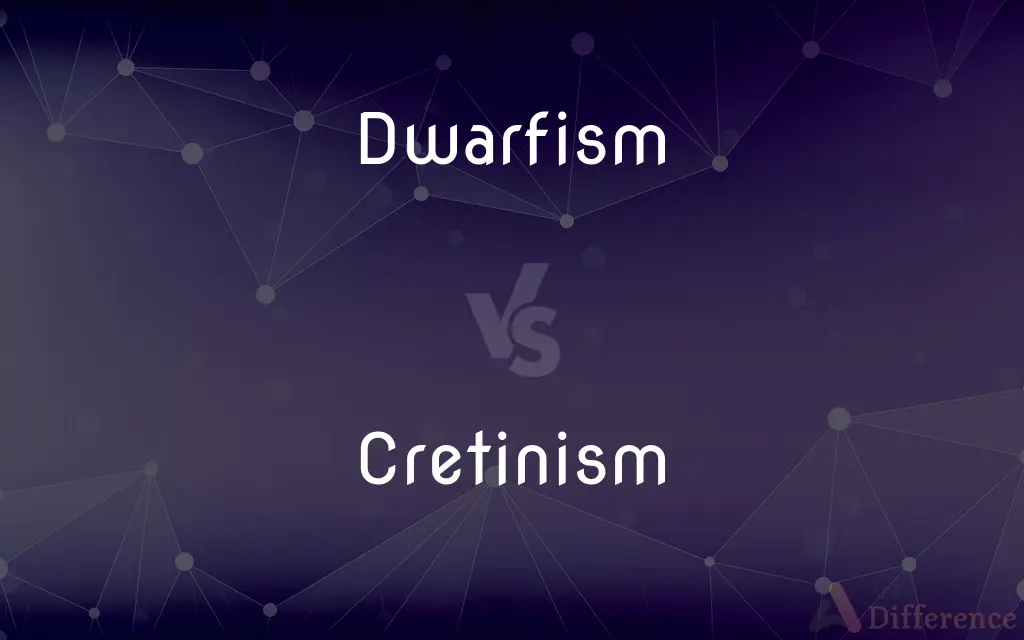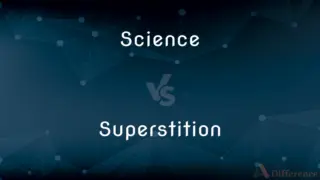Dwarfism vs. Cretinism — What's the Difference?
By Tayyaba Rehman — Updated on September 27, 2023
Dwarfism is a condition resulting in short stature due to a variety of genetic or medical reasons, while Cretinism is a specific form of dwarfism caused by congenital thyroid deficiency.

Difference Between Dwarfism and Cretinism
Table of Contents
ADVERTISEMENT
Key Differences
Dwarfism refers to a medical or genetic condition that results in an adult height below 4 feet 10 inches. This can be due to over 200 distinct conditions, many of which are genetic. On the other hand, Cretinism is a very specific condition related to a congenital deficiency in thyroid hormone, leading to mental and physical retardation.
While Dwarfism encompasses a wide range of causes, from bone disorders to metabolic issues, Cretinism is distinctly rooted in thyroid dysfunction. In particular, a lack of thyroid hormone during prenatal development and early childhood leads to Cretinism. This is why iodine supplementation during pregnancy is crucial in areas with iodine-deficient soils.
It's important to note that Dwarfism can present without any other health complications, and individuals with dwarfism can lead healthy, normal lives. In contrast, untreated Cretinism leads not just to stunted growth but also to severe intellectual disabilities and other health issues.
In summary, while both Dwarfism and Cretinism result in shorter stature, the root causes and associated health implications are distinct. Dwarfism is a broad term encompassing many conditions, while Cretinism specifically points to congenital thyroid deficiency.
Comparison Chart
Definition
A medical or genetic condition resulting in short stature.
A specific type of dwarfism due to congenital thyroid deficiency.
ADVERTISEMENT
Causes
Over 200 distinct conditions, many genetic.
Lack of thyroid hormone during prenatal development.
Associated Complications
May or may not have other health complications.
Severe intellectual disabilities, stunted growth, and health issues.
Treatments
Varies based on the specific condition.
Thyroid hormone replacement therapy.
Global Prevalence
Varies widely based on the specific cause.
More common in iodine-deficient areas.
Compare with Definitions
Dwarfism
A medical condition resulting in a shorter than average stature.
Many people with Dwarfism lead fulfilling lives without major health complications.
Cretinism
A severe form of congenital hypothyroidism leading to stunted growth.
Early detection and treatment can prevent severe effects of Cretinism.
Dwarfism
A broad term encompassing over 200 conditions leading to short stature.
Dwarfism can be due to genetic mutations or certain medical conditions.
Cretinism
Can lead to profound intellectual disabilities.
Cretinism, if untreated, affects both physical and cognitive development.
Dwarfism
Often results from bone growth disorders.
Achondroplasia is a common cause of Dwarfism.
Cretinism
Specifically caused by congenital thyroid deficiency.
Cretinism is more than just dwarfism; it also affects mental development.
Dwarfism
A height outcome generally below 4 feet 10 inches in adults.
Dwarfism can be diagnosed early in life through specific indicators.
Cretinism
Typically diagnosed in infancy or early childhood.
Timely intervention is crucial in managing Cretinism effectively.
Dwarfism
Dwarfism occurs when an organism is exceptionally small. In humans, it is sometimes defined as an adult height of less than 147 centimetres (4 ft 10 in), regardless of sex; the average adult height among people with dwarfism is 122 centimetres (4 ft 0 in), although some individuals with dwarfism are slightly taller.
Cretinism
Resulting from a lack of thyroid hormone during early development.
Iodine supplementation can reduce the risk of Cretinism in iodine-deficient areas.
Dwarfism
The medical condition of being a dwarf.
Cretinism
A congenital condition caused by a deficiency of thyroid hormone during prenatal development and characterized by small stature, intellectual disability, dystrophy of the bones, and a low basal metabolism.
Dwarfism
The condition of being a dwarf animal or plant. In both senses also called nanism.
Cretinism
(disease) A condition of severely stunted physical and mental growth due to the untreated congenital deficiency of thyroid hormones.
Dwarfism
The condition of being a dwarf person of short stature.
Cretinism
A condition of endemic or inherited idiocy, accompanied by physical degeneracy and deformity (usually with goiter), frequent in certain mountain valleys, esp. of the Alps.
Dwarfism
The quality of being puny or inferior.
Cretinism
Severe hypothyroidism resulting in physical and mental stunting
Dwarfism
A genetic abnormality resulting in short stature
Dwarfism
Can present without associated health issues.
Despite her Dwarfism, Lisa excelled in various sports.
Common Curiosities
How is Dwarfism diagnosed?
Dwarfism can be diagnosed through genetic testing, bone X-rays, and assessment of growth patterns.
What are the primary symptoms of Cretinism?
Cretinism presents with stunted growth, intellectual disabilities, and sometimes facial and limb deformities.
Can someone with Dwarfism lead a normal life span?
Yes, many people with Dwarfism have a normal life expectancy, though certain health issues related to their condition may arise.
What is Dwarfism?
Dwarfism is a condition characterized by short stature, typically resulting from genetic or medical factors.
Is Dwarfism always hereditary?
While many forms of Dwarfism are genetic, not all are hereditary. Some arise from spontaneous genetic mutations or medical conditions.
Are individuals with Dwarfism limited in daily activities?
People with Dwarfism can participate in various activities, though some might need adaptations or face challenges based on their specific condition.
Is Cretinism the same as Dwarfism?
No, while Cretinism results in short stature, it specifically arises from congenital thyroid hormone deficiency.
How is Cretinism treated?
Cretinism is managed with thyroid hormone replacement therapy, ideally starting soon after birth.
Is Cretinism common worldwide?
Cretinism is more common in areas with iodine-deficient soils but has decreased globally due to iodine supplementation programs.
Are there support groups available for families affected by Dwarfism?
Yes, there are many support groups and organizations worldwide dedicated to providing resources and community for those with Dwarfism.
Is Dwarfism considered a disability?
Dwarfism itself is not a disability, but individuals might face physical challenges due to their stature and specific condition. Some people with Dwarfism might consider themselves as having a disability, while others might not.
Can Cretinism be prevented?
Cretinism, linked to iodine deficiency, can often be prevented with proper prenatal care and iodine supplementation in deficient areas.
What is the most common cause of Dwarfism?
Achondroplasia is one of the most common genetic causes of Dwarfism.
Can Cretinism affect a child's intellectual capabilities?
Yes, untreated Cretinism can lead to significant intellectual disabilities.
Are there environmental factors that can lead to Cretinism?
Cretinism can result from severe iodine deficiency in the mother during pregnancy, which is an environmental factor.
Share Your Discovery

Previous Comparison
Science vs. Superstition
Next Comparison
Bud vs. ShootAuthor Spotlight
Written by
Tayyaba RehmanTayyaba Rehman is a distinguished writer, currently serving as a primary contributor to askdifference.com. As a researcher in semantics and etymology, Tayyaba's passion for the complexity of languages and their distinctions has found a perfect home on the platform. Tayyaba delves into the intricacies of language, distinguishing between commonly confused words and phrases, thereby providing clarity for readers worldwide.














































